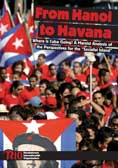




 The Cuban regime is known for its internationalism – Fidel Castro was saluted by Nelson Mandela for the contribution made by Cuban troops to the struggle against Apartheid in South Africa. Cuban doctors in Venezuela and all over the world have made important contributions to raising the standards of living in the poorest countries.
The Cuban regime is known for its internationalism – Fidel Castro was saluted by Nelson Mandela for the contribution made by Cuban troops to the struggle against Apartheid in South Africa. Cuban doctors in Venezuela and all over the world have made important contributions to raising the standards of living in the poorest countries.
However, Cuba’s foreign policy has never been revolutionary in the Marxist sense of the word. Throughout the last decade, many Latin American countries were shaken by crises, yet the Cuban government never worked to channel these crises towards the abolishment of capitalism. In Argentina, Bolivia, Venezuela or Honduras, Cuba’s representatives supported one populist bourgeois figure or another, instead of showing the road to workers’ and peasants’ power. At times the Cuban leadership has even been prepared to support completely reactionary governments such as the military dictatorship established in Argentina in 1976. This was because the dictatorship, even though it massacred the vanguard of the workers and youth with 30,000 disappearances, had a foreign trade policy that was somewhat friendly to the Soviet Union!
Most importantly, in Nicaragua, after a guerilla struggle and mass uprisings toppled a pro-imperialist regime and posed the question of abolishing capitalism, Castro encouraged the Nicaraguans not to follow the “Cuban road”, i.e. not to expropriate the bourgeoisie. He used the moral authority of the Cuban Revolution not to smash but to save capitalism in Central America, due to the foreign policy interests of the Soviet Union at the time[44]. Similarly, Castro defended the Soviet invasion to crush the Prague Spring in 1968 and the crackdown on Solidarnosc in Poland in 1981, just as he opposed any rebellion against Stalinism, fearing potential instability for his system.
This foreign policy has two sources: one is the strategic concept of the Cuban bureaucracy and the entire former “socialist block” which submits the goal of workers’ revolution to the maintenance of their bureaucratic systems. This was described by Trotsky in respect to the Soviet Union in the 1930s[45]. The other is the distorted variant of Marxism advocated by the Cuban leadership which was based on a guerilla struggle amongst the peasants. This strategy was shown to be completely hopeless when attempted by Che Guevara in Bolivia in the late 1960s – yet in 1970, the Bolivian working class organized an urban insurrection and made amply clear that they alone had the power to break the chains of imperialism. Similarly, the Cuban leadership threw their weight behind the popular front government of Salvador Allende in Chile: Castro famously gave Allende a gold-plated AK47, but he offered no advice to the Chilean working class on the need to arm itself against the looming counterrevolution.
Notes:
44. Castro made countless statements in this regard.
For example: The situation in Nicaragua “requires a national reconstruction program with the participation of all sectors of Nicaraguan society.” Speech on the 26th anniversary of the assault on the Moncada Barracks. July 26, 1979.
Or: “According to Castro, the plan followed by the Nicaraguans is ‘perfect’: Without giving up being revolutionaries, they postpone the construction of socialism until it becomes possible and limit themselves for the time being to structural reforms, the most important of which is agrarian reform.” EFE: Castro discusses Central America, Disarmament. February 18, 1985.
45. Leon Trotsky: The Revolution Betrayed. Chapter 8, Part 1: “From ‘World Revolution’ to Status Quo.“
Leave a Reply
